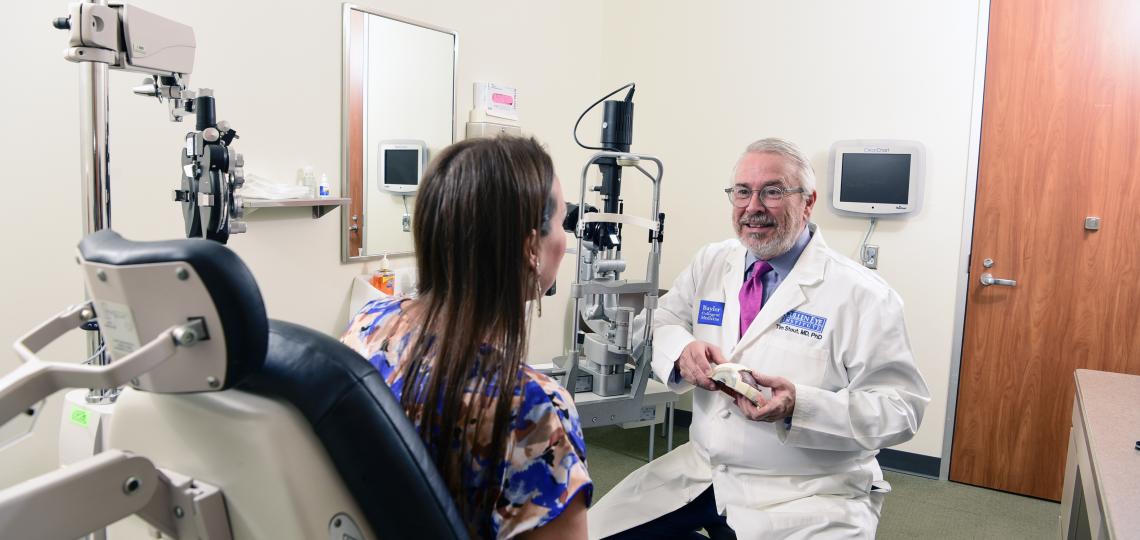Leading Cardiologist in Andalusia: Expert Heart Care at Your Local Clinic
Leading Cardiologist in Andalusia: Expert Heart Care at Your Local Clinic
Blog Article
Is Refractive Surgical Treatment Right for You? Variables to Consider for Better Eyecare
In the realm of eye care, the decision to go through refractive surgical procedure is a significant one that requires thoughtful factor to consider. As individuals seek clearness and liberty from the restraints of corrective lenses, many variables enter into play when establishing the viability of such a procedure. From the complexities of one's ocular health to the ins and outs of personal expectations and everyday routines, each element holds value in the more comprehensive landscape of refractive surgery candidacy. By assessing these crucial aspects with treatment and accuracy, a more clear path towards notified decision-making arises.
Eye Health And Wellness Examination
When taking into consideration refractive surgical procedure, a comprehensive eye health and wellness examination is important to evaluate the viability of the procedure for each person. cardiologist andalusia. This analysis includes a series of evaluations and examinations carried out by an eye care specialist to figure out the overall wellness of the eyes, the visibility of any type of underlying problems, and the stability of the refractive error
Throughout the assessment, numerous aspects are considered, such as the person's case history, existing eye prescription, corneal thickness, student size, and tear movie high quality. These assessments assist to determine any type of contraindications to refractive surgery, such as corneal problems, cataracts, or neglected eye infections. Additionally, the evaluation aids to manage individual assumptions relating to the prospective end results of the surgical treatment based on their unique eye qualities.
Inevitably, the eye health assessment is important in ensuring the safety and effectiveness of refractive surgery, as it provides important understandings right into the person's eye wellness status and assists establish the most appropriate therapy choices for attaining optimum aesthetic outcomes. (eye doctors in andalusia)
Lifestyle Evaluation
A comprehensive lifestyle analysis is essential in figuring out the suitability of refractive surgical treatment for a person's visual improvement needs. Way of living elements such as line of work, hobbies, and day-to-day activities play a crucial function in the decision-making procedure concerning refractive surgical procedure.
Additionally, way of living habits such as sports engagement, outdoor activities, and even skincare routines can influence the recovery procedure and overall success of refractive surgical treatment. As an example, individuals who involve in call sporting activities may need to take additional precautions to shield their eyes during the healing duration. Furthermore, people with considerable sunlight direct exposure might require additional post-operative like avoid issues. By performing a thorough lifestyle assessment, eye care professionals can tailor their recommendations and treatment plans to meet the distinct needs of each client, eventually causing boosted aesthetic end results and complete satisfaction.
Assumption Positioning

People need to understand that while lots of people accomplish 20/20 vision or far better adhering to refractive surgical treatment, some might still require glasses for specific activities like reading or driving at night. Managing these assumptions helps protect against frustration and frustration post-surgery, leading to a much more positive total experience for the client.
Threat Analysis

Factors that might raise the danger of complications include age, specific clinical problems like autoimmune illness, unstable vision prescription, thin corneas, and impractical person expectations. In addition, choosing a seasoned and competent doctor, adhering to pre and post-operative care instructions vigilantly, and divulging any kind of pertinent medical background can aid minimize threats.
To decrease the possibility of problems, ophthalmologists carry out extensive pre-operative assessments to recognize any type of contraindications to surgery. They also go over the prospective dangers and advantages with patients during the consultation procedure. By participating in open interaction and shared decision-making, both the person and the eye doctor can collaborate to figure out if refractive surgical treatment is the ideal option based upon individual danger profiles and preferred results.
Consultation Significance
Taking into consideration read here the important role of notified decision-making in analyzing risks and possible issues in refractive surgical procedure, the examination process holds substantial significance in assisting individuals in the direction of optimum end results. Throughout the consultation, the ophthalmologist evaluates the patient's eye health, refractive mistakes, and general suitability for surgical treatment. This initial assessment is crucial in identifying the most appropriate treatment for each person, taking into consideration elements such as corneal density, pupil dimension, and existing eye problems.
Moreover, the consultation works as a possibility for people to discuss their assumptions, problems, and any inquiries they may have pertaining to the surgery. Clear communication in between the client and the doctor is necessary to ensure practical assumptions and an extensive understanding of the prospective risks and advantages included.
Additionally, the consultation allows the specialist to explain the different medical choices available, their corresponding results, and the post-operative treatment called for. This extensive conversation encourages patients to make well-informed decisions regarding their eye care, resulting in much better contentment and outcomes post-surgery.
Verdict
In conclusion, individuals considering refractive surgical procedure needs to go through a thorough eye health evaluation, analyze their way of living routines, straighten their assumptions with potential results, examine the affiliated dangers, and focus on examinations with eye care professionals. These elements play a straight from the source crucial role in determining the viability of refractive surgical treatment for each person, ensuring ideal outcomes and contentment with the procedure.
People thinking about refractive surgical treatment often have high assumptions regarding the end results, anticipating best vision without the requirement for glasses or call lenses. While refractive surgical treatment can significantly enhance vision and minimize dependency on visual aids, it is crucial for individuals to comprehend that results might differ based on individual aspects such as the degree of refractive mistake, corneal density, and general eye health and wellness.
By engaging in open communication and shared decision-making, both the person and the eye doctor can function together to figure out if refractive surgical procedure is the ideal option based on specific danger profiles and preferred outcomes.
Taking into consideration the essential role of educated decision-making in examining risks and possible difficulties in refractive surgical procedure, the assessment process holds significant relevance in leading clients in the direction of optimum end results. Throughout the appointment, the ophthalmologist assesses the client's eye health, refractive mistakes, and general suitability for surgical procedure.
Report this page